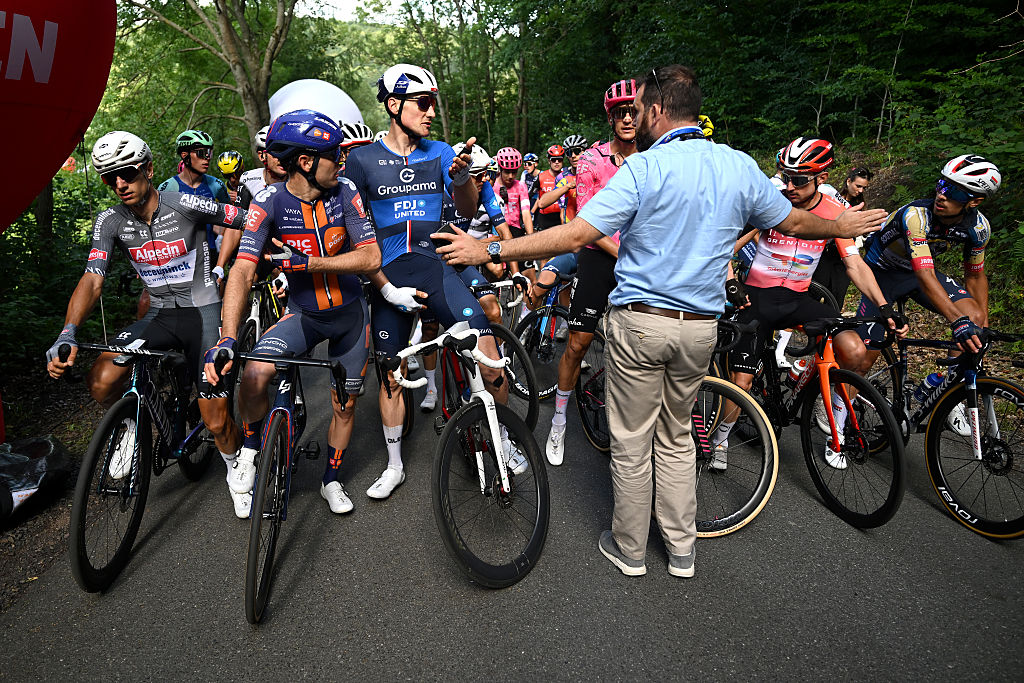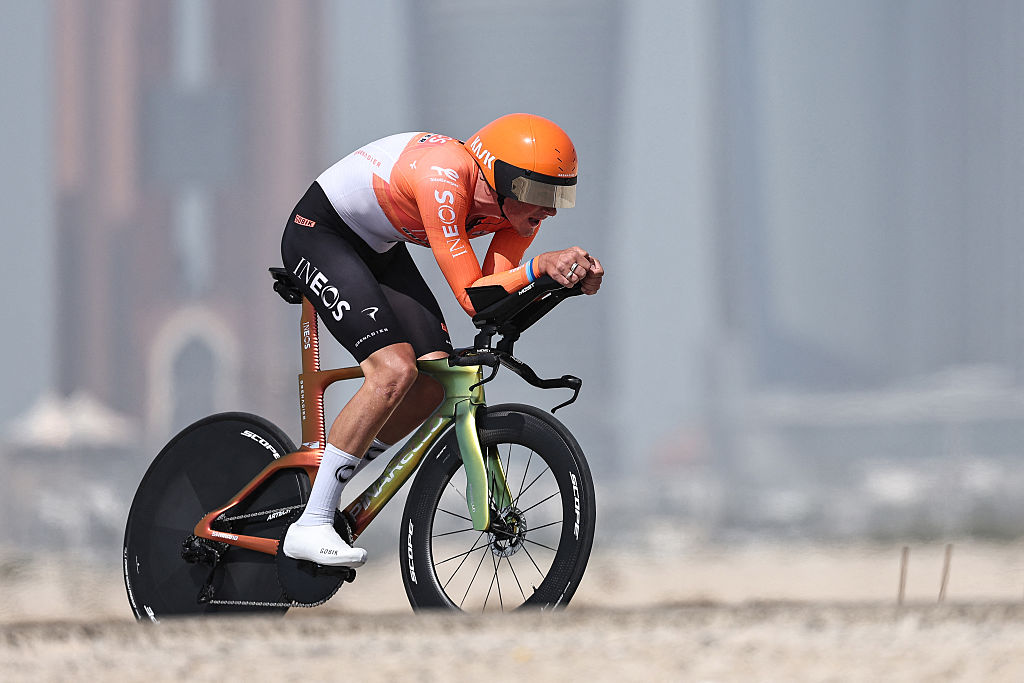'Just one mistake, it's really unlucky' - Tumultuous scenes at Tour de Pologne as major crash forces partial neutralisation of Queen stage
Riders and teams praise decision to suspend race as all ambulances attend injured

The latest race content, interviews, features, reviews and expert buying guides, direct to your inbox!
You are now subscribed
Your newsletter sign-up was successful
The 2025 Tour de Pologne teetered on the edge of having its biggest stage cancelled on Wednesday as a major late downhill crash left the race stopped completely for 15 minutes, multiple riders injured, and the final 15 kilometres neutralised for the GC riders.
The ultra-hilly stage in southern Poland was finally completed, with Ineos Grenadiers' Ben Turner winning a 50-rider sprint in a finish outside a former coal mine near the town of Walbrzych.
But the Briton's first-ever WorldTour win was almost completely overshadowed by the dramatic events of half an hour before.
The crash on a fast, narrow section of densely wooded downhill saw race leader Paul Lapeira (Decathlon AG2R La Mondiale) and former Pologne winner Rafal Majka (UAE team Emirates-XRG) amongst the multiple fallers, second-placed Mathias Vacek (Lidl-Trek) forced to abandon, and several other riders, including UAE Team Emirates-XRG's young Italian racer Filippo Baroncini, forced to quit.
Contrary to initial reports that he had abandoned, a battered and bruised Lapeira was able to complete the course, well down on the main group, and his team said in a statement later that he will be at the start tomorrow. However, his physical condition was anything but ideal.
The crash itself then led to organisers moving ahead of the bunch and three-rider break at the time, telling the peloton to stop and wait while ambulances regained contact with the race. For 15 long minutes, there was a collective holding of breath as team reports on the state of injured riders were radioed or telephoned through, with the decision as to whether the race could continue was taken.
Finally, the decision was made to go ahead, but with the GC battle put on hold and after such a bad crash, the outcome of the stage became much less relevant for many race observers than the consequences of what had happened 15 kilometres earlier on a previously utterly unremarkable chunk of south Polish countryside.
The latest race content, interviews, features, reviews and expert buying guides, direct to your inbox!
"The decision to stop came through quite quickly because it was a big mess," Lotto sports director Dirk Demol told Cyclingnews at the finish.
"There were some panic because the ambulance had to come and get through quickly to the crash, telling us all in the race convoy to stay on the right, stay on the right."
"It was unlucky that it happened, but they took the right decision, I 100% agree. They do a lot for the safety here, they warn us a lot on Radio Tour but accidents can still happen - and if you want to be in the game, sometimes you have to take risks."
The crash itself happened on a downhill which riders had already tackled twice on a stage with multiple circuits of six category 2 and category 1 climbs, likened to Cyclingnews by former local pro Tomas Marczinski, now a TV commentator on the race, to "a kind of Polish Liège-Bastogne-Liège."
Like the Belgian Ardennes Classics, the narrow, twisting roads and fast descents can make for some really bad crashes. But this time around, after a relatively incident-free previous 140 kilometres, the last time coming off the final climb, the Przelecz Niedzwiedzica was where near-disaster struck.
"It was a fast downhill, small road, leaves little room for error, but they went over it two times OK and then one mistake, it's really unlucky," Decathlon AG2R La Mondiale DS Luke Roberts told Cyclingnews.
"Several riders went down quite hard in that crash, and it took a while for the doctors and medical crew to be able to check on everybody. So they took the correct decision to then neutralise the race, can't let the race go ahead without the medical support there."
As for Lapeira, he was one of those badly affected. Even if he was able to return to the race, he arrived at the finish line, his yellow-clad figure rode straight to the team bus, without any of the usual post-stage ceremonies.
"It took him quite some time to get back on the bike: he's beat up quite bad," Roberts added. "He took quite an impact to his back and had difficulty breathing. He rode ahead and got to the point when they neutralized the race, but at that moment he was unable to continue racing at the, so he came in with the group.
"We'll have to see what the medical group says about him, fingers crossed he's ok."
Roberts was left reflecting on a stage where the team suffered another wild variation in its luck in Poland this year - a stage 1 crash for Sam Bennett, a win and overall lead with Lapeira, a crashout and broken collarbone for Rasmus Pedersen and then the bad crash in the yellow jersey on Wednesday. As he put it with a rueful grin, "It doesn't get more up and down than that."
And as ever in a major upheaval in a bike race like Wednesday's pile-up, as they crossed the finish line, then picked their way through the crowds to the team buses sitting outside the former mine's outbuildings, nearly every rider had a story to tell.
Speaking before he and his team staff at the finish even knew Baroncini had fallen, UAE overall contender Jan Christen told reporters, "When the crash happened I was also in the front with some other guys and we looked at each other and we were like, oh, now we first wait, and then the radio told us to stop. I think it was the right decision, but it was a pity for me as I had super legs.
"I felt I could go in yellow today and get some seconds back. But I hope all the guys are ok, and I look forward to tomorrow."
The organisers later explained in a formal statement that "In accordance with safety regulations and procedures, we made the decision to neutralize the race and stop the entire peloton to prevent further risk. Once the situation was under control and the ambulances rejoined the race, the peloton resumed."
But the real consequences were being felt across the peloton, as the list of injuries and abandons slowly hardened into a more definitive reality. And it's only once stage 4 has got underway on Thursday that it will likely really feel that things are once again back to normal at the 2025 Tour de Pologne.
Alasdair Fotheringham has been reporting on cycling since 1991. He has covered every Tour de France since 1992 bar one, as well as numerous other bike races of all shapes and sizes, ranging from the Olympic Games in 2008 to the now sadly defunct Subida a Urkiola hill climb in Spain. As well as working for Cyclingnews, he has also written for The Independent, The Guardian, ProCycling, The Express and Reuters.
You must confirm your public display name before commenting
Please logout and then login again, you will then be prompted to enter your display name.

